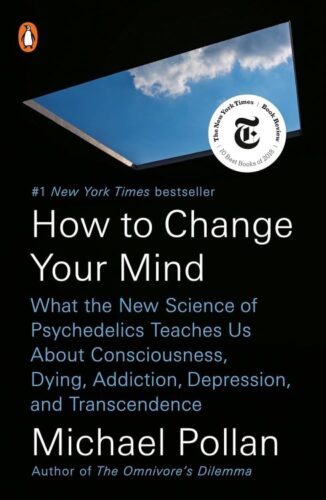Mushrooms for Therapy
September Blog 2024
Hello Everyone,
I am writing this on my back deck on a wonderful, warm and sunny day. I really love this weather and hope it continues on and on.
This month, I have been reading “How to Change your Mind; what the new science of psychedelics is teaching us about consciousness, dying, addiction, depression and transcendence” by Michael Pollan.

In the book Pollan discusses psilocybin mushrooms, the history of their use in the 1950’s until the time they were banned in 1969 because of the social effect they were having. There was a lot of research going on in Saskatchewan in the 1950’s using these mushrooms therapeutically to treat depression, addiction, obsessive compulsive disorder, and even schizophrenia. The research was very promising, but was shut down.
This history was all but forgotten until the 1980 and 1990’s when some very small studies were done with cancer patients nearing the end of their lives, to help with their anxiety about dying. This was very successful and permission was given to use the mushrooms with people suffering from severe intractable depression.
The book is an interweaving of the personal experiences Pollan had taking LSD, psilocybin and toad juice with science, and interviews with scientists, researchers and volunteers. He explains theories of the mind in clear, easy to follow, well thought out terms.
It is interesting reading and I would recommend it. https://www.amazon.ca/Change-Your-Mind-Consciousness-Transcendence/dp/1594204225
Mushrooms
Michael Pollan’s book made me think about how science is finding that many types of mushrooms are proving to be potent remedies for many illnesses. Traditional medicine and particularly those in Asian cultures have long revered mushrooms like Lion’s Mane, Reishi, Cordyceps, Chaga and Oyster. Western medicine is now recognizing their value.
I love mushrooms and buy these at farmer’s markets whenever I can. I thought that I would talk about a few of them and their benefits.
Lion’s Mane Mushroom: The Brain Booster
Lion’s mane is one of the most well-known medicinal mushrooms, celebrated for its potential neuroprotective properties. It is a beautiful white mushroom that looks like a lion’s mane. Studies have shown that lion’s mane may stimulate the production of nerve growth factor (NGF), a protein essential for the growth, maintenance, and survival of nerve cells.
Lion’s mane is believed to support cognitive function, improve memory, and may even help in preventing neurodegenerative diseases like Alzheimer’s.
Shitake Mushrooms: Heart Health
It is said that shitake mushrooms are the most popular mushrooms in the world and they have been used in China and Japan for centuries. These mushrooms have been found to reduce cholesterol levels, reduce inflammation, and are great for immunity and liver health.
Reishi Mushrooms: The Immune System Modulator
Known as the “mushroom of immortality,” reishi has been used in Traditional Chinese Medicine for thousands of years. This mushroom is famed for its ability to balance the immune system. It also helps the body adapt to stress, promoting overall balance and well-being. This is another mushroom that has anti-inflammatory and antioxidant properties that improve cardiovascular health and reduce the effects of aging.
Chaga Mushroom: The Antioxidant Champion
Chaga is a mushroom that grows mainly on birch trees in cold climates, like those in Canada, Siberia and Northern Europe. Rich in antioxidants, Chaga is known for its ability to fight free radicals, unstable molecules that can damage cells and accelerate aging. In fact, it’s one of the most antioxidant-rich foods on the planet.
Traditionally, Chaga has been used to support immune health, reduce inflammation, and improve skin conditions. Its high levels of melanin are thought to protect the skin from UV radiation, and its anti-inflammatory properties may support gut health, a crucial aspect of overall wellness.
Cordyceps Mushroom: The Energy Enhancer
Cordyceps is a fascinating mushroom with a long history in Chinese medicine, often used to enhance athletic performance and boost energy levels.
Athletes often turn to Cordyceps for a natural boost in stamina and endurance. Additionally, studies suggest that it may improve oxygen uptake and enhance respiratory function, making it beneficial for those with respiratory conditions like asthma.
Oyster Mushrooms: Supports heart and metabolic health.
This is one of the most widely cultivated mushrooms and research has shown that it can improve immune system function against respiratory infections, contribute to the lowering of cholesterol, and help the body maintain healthy levels of cholesterol and triglycerides.
In Summary
These are just a few of the medicinal mushrooms available. They come in various forms: – fresh, teas, capsules and tinctures, – and are readily available.
As the science behind medicinal mushrooms continues to evolve, more potential benefits are likely to be uncovered. Whether you’re looking to support brain health with lion’s mane, boost your immune system with reishi, or improve your energy levels with cordyceps, there’s a mushroom out there that may fit your needs.
However, it’s important to consult with a healthcare professional before adding any new supplement to your regimen, especially if you’re on medication or have pre-existing health conditions.
For my own health, I take capsules of lion’s mane and a mixture of other mushrooms every day.
Have you had a chance to look at my book yet?In my book Joey and His Friend Water, I use the voice of Water as a teacher to weave a story about how everything is conscious and connected – the earth, moon, stars, people, and everything in between. It’s a great book for young children and for those who are reading to them. We’re all in it together. If you’re interested in purchasing Joey and His Friend Water, you can find it online, including at Amazon. You can also learn more about the book at my website https://ellenlewinbergauthor.com/ |

Hope you have a great month. Enjoy the warm weather while it lasts.
Warmly
Ellen